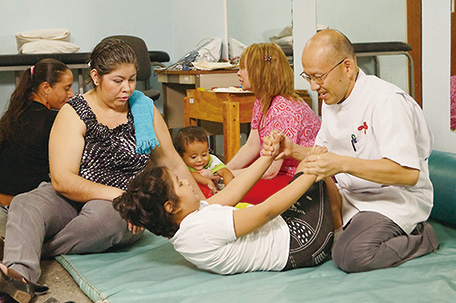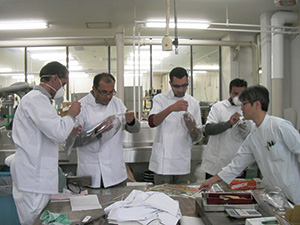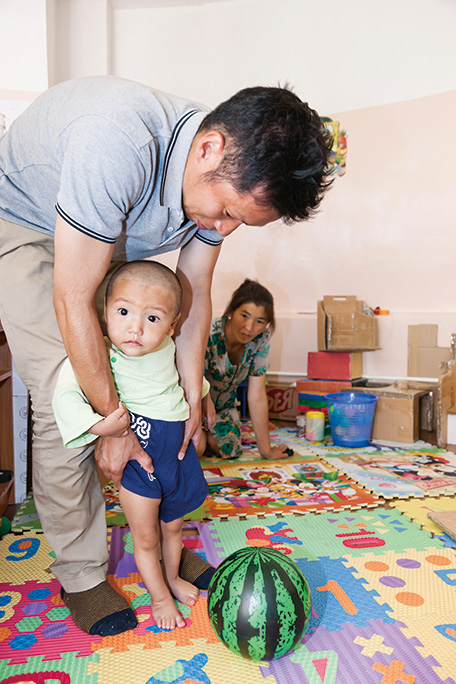(6) Employment and Social Security
“Labour,” i.e., “work,” constitutes a fundamental activity of mankind that shapes society. Increasing income by finding employment is an important means for elevating the standard of living of poor people. Nevertheless, a severe employment situation persists, with the number of unemployed in the world reaching approximately 200 million people in 2013.(Note 7) To create stable employment under these circumstances that will lead to poverty reduction, it is an urgent task to stand ready for risks by developing social safety nets, as well as to realize “decent work”(Note 8) across countries at the regional level.
Furthermore, it is important to promote capacity-building and community development that ensure the social participation and inclusion of people in vulnerable positions in society, such as young people and women, especially persons with disabilities.
| Employment
Japan considers job creation to be one approach for reducing poverty, and one of the priorities of Japan's development cooperation. Based on this concept, Japan extends assistance to increase job seekers' abilities to make a living through vocational training. Japan also provides assistance that expands social security, such as support for creating employment insurance systems and support for realizing occupational safety and health, with a view to achieving “decent work.”
In addition, Japan provides voluntary funding to the International Labour Organization (ILO) to implement job creation projects following natural disasters, such as the typhoon disaster in the Philippines, as well as to conduct humanitarian assistance in conflict regions in Africa. Japan is actively engaged in activities through international organizations and plays a significant role in resolving labour issues throughout the world.
| Assistance for persons with disabilities

A Senior Volunteer, Mr. Takashi Nishida conducting a therapy session for a child with cerebral palsy in the Centro de Rehabilitacion Integral de Orientoin San Miguel Prefecture, Eastern El Salvador. (Photo: Ernest Manzano / JICA)
It is Japan's policy to pay due attention to the socially vulnerable, including persons with disabilities, when planning and implementing ODA policies for development cooperation. Policies for persons with disabilities cover a number of different fields, including welfare, health and medical care, education, and employment. Japan has utilized the techniques and experiences Japan has accumulated in these fields through ODA and NGO activities to promote measures for persons with disabilities in developing countries. For example, Japan has been providing suitable assistance to various local needs, such as promoting barrier-free transportation including railroads and airports, building vocational training and rehabilitation facilities for persons with disabilities, and providing minibuses for their transportation.
Additionally, through JICA, Japan has conducted wide-scale technical cooperation efforts to build capacity for organizations and personnel offering assistance to persons with disabilities in developing countries. Included among these efforts are the acceptance of trainees from developing countries and the dispatch of JOCV and a variety of experts, including physical and occupational therapists and social workers.
In January 2014, Japan ratified the Convention on the Rights of Persons with Disabilities. The Convention establishes independent clauses setting out that states parties will undertake measures for international cooperation and its promotion (Article 32). Japan will continue to contribute to increasing the rights of persons with disabilities in developing countries through ODA and other means.
- Note 7: Source: “Global Employment Trends 2014” (ILO)
- Note 8: The term “decent work” was employed for the first time at the International Labour Conference in 1999.
| Libya
Rehabilitation Techniques
Training Program by Country (training in Japan) (September 2012 – Ongoing)

Trainees learning techniques to make artificial limbs. (Photo: JICA)
Three years after the establishment of a new government in Libya in 2011 following a large-scale democratization movement and armed conflicts, early reintegration of Libyans who sustained injuries from the civil war by providing medical treatment and rehabilitation programs is still an urgent priority for the country. However, the number of physiotherapists and those who can produce prosthetics and orthotics in Libya was extremely limited, and their knowledge and technical skills tend to be based solely on training they received several decades ago outside the country. Thus, there is a shortage of medical and welfare practitioners both in terms of quantity and quality. It has therefore been deemed necessary to address the situation first and foremost.
To support the training of medical and welfare practitioners in Libya, Japan started in 2012 to invite personnel from Libya's Ministry of Social Affairs, Ministry of Health, and rehabilitation centers affiliated with the country's training programs to learn about Japan's experience in the area of rehabilitation as well as about how to make prosthetic limbs. Prosthetic limbs are artificial limbs (arms and legs) worn by people who lost their limbs due to injuries or illnesses. Specialized knowledge and skills are required to make and adjust prosthetic limbs that fit each user, beginning with the measurements and casting.
In September 2012, Japan organized a training session on the management of rehabilitation programs for persons with disabilities. Thirteen participants including the Minister of Social Affairs took part in the program from Libya and deepened their understanding on laws and policies, structures, the human resources development system, and the provision of services related to prosthetic limbs. In addition, in October 2013 and January 2014, a total of 12 medical personnel were invited to Japan for rehabilitation technique (physician and physiotherapist) training. In November 2013, Japan organized a training session on the making of prosthetic limbs and braces for four Libyan prosthetists and orthotists. At that time, Japan also provided training supplies that are needed to spread prosthetic and orthotic techniques in Libya.
(As of August 2014)

A Japan Overseas Cooperation Volunteer (physiotherapist/occupational therapist), Mr. Shinichi Noguchi (pediatric rehabilitation expert), conducting walking training in a pediatric rehabilitation room in Kyrgyz Republic. (Photo: Kaku Suzuki / JICA)
